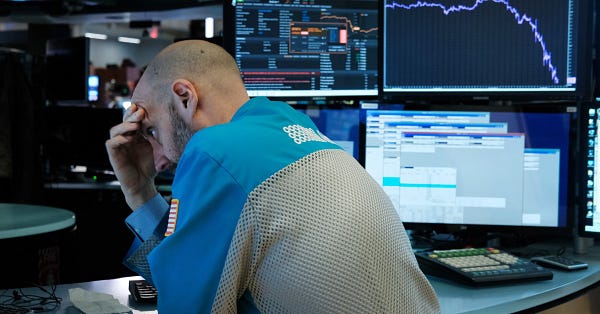An Open Letter about SVB, Vulnerability, and Imperfect Business Models.
Why to write?
After a week of Expo West, hard work at Savor, catching flights, trying to be a caring mom, wife and friend, on Thursday morning the news about SVB fallout started leaking and my Earth started shaking: “Venture firms are advising portfolio companies to move money out of SVB.”
First and foremost, I'm writing this piece to reach people who are feeling similarly, who are tirelessly running towards the accomplishment of an important mission and this weekend feels like the time paused. I know I am not alone, and you aren’t either. My message is: there isn’t a better time to be human to each other.
Secondly, I’m sharing my opinion because I believe the panic that is by-design created by the media is wrong on all fronts, and the people who are working their as*es off every single day, building solutions needed for not only the survivorship of this world, but for its blossom, have the responsibility to speak up and share their human version. A version who is actually grounded in daily work experience, in humanity, kindness and vulnerability — with no paywalls, clickbaity titles and advertisement.
Do we have the right to blame SVB?
“[SVB] struggling under the weight of ill-fated decisions and panicked customers, collapsed on Friday, forcing the federal government to step in.” — NYT
Ill-fated decisions — really?
TL;DR: As far as we know from released information SVB wasn’t a reckless bank, and calling the decisions taken “ill-fated” is a clickbait-driven exaggeration.
SVB has been an ally for thousands of highly innovative companies hitting the ground running. It was always been a good bank (I used it for several companies of mine, and that I’m close to). Extremely easy to interact with, supportive with debt lines, and always willing to make connections within the ecosystem. An undemanding bank who let you focus on your work. If I could go back, I would have no reason not to choose it again over the years of my career.
More: SVB did what all banks do, keeping a fraction of the deposits on hand and invested the rest. In 2018, Trump signed a bill that lessened regulatory scrutiny for many regional banks, reducing how frequently banks with assets between $100 billion and $250 billion had to submit to stress tests by the Fed. SVB had $209 billion in assets at the end of 2022.
Looking deeper at where their investment went, the bank put a large share of customer deposits into long-dated Treasury bonds — government debt securities issued by the U.S. Federal government that have maturities greater than 20 years. What is commonly consider safe.
When the start-up funding slowed at the same time as interest rates were rising, companies began to withdraw more money and bring less in. To pay those redemption requests, SVB sold off some of its investments at a lost, and seeked fresh capital to meet its obligations.
According to the U.S. Treasury Secretary Janet Yellen, even though the bank mostly serves tech workers and venture capital-backed companies, the high interest rate environment is the most likely reason for the fallout.
Panicked customers — why?
TL;DR:
SVB made the same mistake most of VC-backed companies do as well: over focus on investors, under focus on customers;
Media are trapped into business models where they have to be jackals, spreading panic to make money.
SVB dropped their biggest, most intricate, most unnerving news of the year — without any meaningful reassurance to their core customers (startup founders, especially early stage) and the people they listen to the most (influential VCs).
On the other hand, they filed a reassuring and comprehensive form 8-K with the SEC, to disclose a significant event to investors, where SVB included a clear description of the company’s liquidity strategy, rationale for fundraising, and strong capital position. But the 8-K didn’t get their customers and influencers.
SVB seems to have prioritized protecting the stock price and missed a key audience: customers. Which is — in my opinion, a key mistake the tech industry in the Valley is very much used to.
In addition to that, if you leave room to media, they know how to get their clicks in. In a moment where panic is the common enemy, Tech Crunch had the brilliant idea to deliberately add fuel to the fire.


If you clicked in, Natasha Mascarenhas and Alex Wilhelm were very vague, saying how “Some venture capital firms, including some of the biggest names in the game, are advising their portfolio companies to remove money out of Silicon Valley Bank after the storied bank announced this morning that it intended to sell shares in pursuit of more capital”. No name, no proof, nothing.
But then they continue: “to give you a sense of what’s on the table, founders who raise millions of dollars in venture capital financings often park their capital in an SVB account. To have any semblance of that precious capital under threat could set off a domino effect more based on fear than reality. Well-known venture investor Mark Suster spoke out on Twitter in defense of the bank, saying that he believes its CEO […]. Others have also spoken up to support SVB, including Rob Go from NextViewand Bryce Roberts.”

There were names of quotes of well known people that didn’t agree with that panic-fueling narrative. Bummer nothing of that was mentioned in the title, and most of that content was hidden behind a paywall.
So what?
We — people building our common future, every single day, have the responsibility to actively advocate against this type of media industry, their unfair incentive system, ethics railway and business models. If this is one of the toughest weekend for a lot of hard-workers, is also because of how companies like TechCrunch decided to show up on Thursday.
Our vote is important! In 2018, Trump signed a bill that lessened regulatory scrutiny for many regional banks.
A mindset in which investors are more important than customers is set for failure. Companies’ primary beneficiaries are not investors and will never have to be. This is what business schools and VCs have been trying to teach us for decades and this is a good time to evolve.

*This is my personal experience, it’s not specifically linked to Savor or any other specific company. It is a genuine, transparent and humane share-out of what I feel right now, and what frustrates me, given my different positions and my close community.



